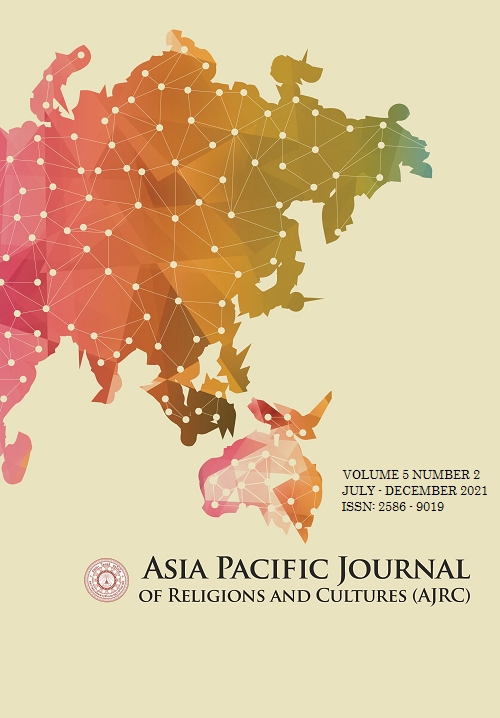Model for the Development of Educational Quality and Standards of Secondary Schools under Bangkok under the New Quality Assurance Framework
Main Article Content
Abstract
The purposes of this research were to study the characteristics of the developed educational quality and standards, to formulate a model for developing its educational quality and educational standards and to evaluate the developed educational quality and standards of the secondary schools under the Bangkok Metropolitan Administration with the new educational quality assurance framework, through 4-step research, i.e. (1) studying new educational quality assurance characteristics, (2) adjusting their educational quality and standards with Delphi technique from 21 experts, (3) analyze the research elements and (4) assess the feasibility of the model for quality development and educational standards of the secondary schools under the new educational quality assurance framework. 210 respondents were questioned for the educational quality assurance. Statistical applications for data analyses were percentage, quartile range, mean, standard deviation.
Findings where the 5 characteristics involved the student result; researches and innovation; academic services; art, culture, and lean schools including management. Second, the model for developing educational quality and standards according to a new quality assurance framework demanded to develop the educational quality and standards by focusing more on student outcomes with researches and creation of innovation; academic services; management and quality management. Finally, the model for developing educational quality and standards with the new framework for educational quality assurance was viable and suitable at a high level. It was recommended that the educational quality assurance required mechanisms that could control and monitor evaluation and improve in the teaching and learning process in terms of learning results with appropriate links.
Article Details
References
Chaowai, C. (2021). The Role of School Administrators in Managing Internal Resources under the Local Organization in Pathum Thani Province. Journal of Educational Management and Research Innovation, 3(1), 19-28.
Chirotphinyo, N. (2017). The relationship between cooperative management and governance of school administrators under Ratchaburi Educational Service Area Office 2. Journal of Nakhon Phanom University, 25(1), 145-155.
Chitrangsan, N. (2007). Guidelines for site quality development Private studies using management concepts to be excellent in the viewpoint of private school administrators in Samutprakarn Province and experts. (Master’s Thesis). Bansomdejchaopraya Rajabhat University.
Chhon, K. (2020). Life and Hope Association: Engaged Buddhist Strategy Transforming Compassion into Social Action. International Journal of Multidisciplinary in Management and Tourism, 3(2), 105-118.
Dechit, N. et al. (2014). The development of educational quality management model of small schools in Chiang Mai province. Veridian E-Journal. 11(2), 67-77.
Hangsakul, P. G. (2021). Information Technology for Educational Administration. Journal of Educational Management and Research Innovation, 3(1), 1-10.
Intawee, T. (2021). Factors in Affecting Decision Making in Selecting Educational Institutions for Higher . Journal of Educational Innovation and Research, 5(1), 1-14.
Krejcie, R. V. & Morgan, D. W. (1970). Determining Sample Size for Research Activities. Educational and Psychological Measurement, 30(3), 607-610.
Lorsuwanrat, T. (2007). Modern organization theory. Bangkok: Rattanathai.
Nichakonwong, A. (2015). The development of educational administration model By using good governance principles in educational institutions under the Sakon Nakhon Educational Service Area Office 1. (Doctoral dissertation). Western University.
Office of the Higher Education Commission, Ministry of Education. (2008). The 15-Year Higher Education Plan Framework No. 2 (2008-2022). Bangkok: Chulalongkorn University Press.
Office of Macroeconomic Policy Ministry of Education. (2019). Educational reform in the second decade (2009 - 2018). Retrieved May 3, 2017, from https://www.sec.or.th/EN/Pages/ABOUTUS/CMSB_KULAYA.aspx
Pewdum, P. (2021). Professional Learning Community to the Success of the Organization. Journal of Educational Management and Research Innovation, 3(1), 11-18.
Phiphatnarathorn, N., & Chirotepinyo, N. (2018). Management towards excellence of private schools in Bangkok. Journal of Mahachulalongkornrajavidyalaya, 2(1), 223-240.
Punthai, K. (2009). The influence of leadership behaviors, organizational culture and human resource development on employee performance in state enterprises. (Doctoral dissertation).National Institute of
Development Administration.
Sirilamduan, C., Chuaychuny, S., Ruamboon , K., & Srisuk, S. (2021). A Development Web Application for Planning Cultivate Vegetable to Maximize Profits on Nam Kam District, That Phanom, Nakhon Phanom Province, Thailand. International Journal of Multidisciplinary in Management and Tourism, 5(1), 19-28.
Sirirangsri, P. (2012). Participatory Educational Management of Organizations in the Community: Experience from Practice. Bangkok: DPU Cool print.
Srigo, T. et al (2018). Model of educational management at the doctoral degree level in education administration of private higher education institutions. Journal of Narathiwat University, 4(2), 166-171.
Vesarnatch, P. (2011). Principles of Educational Management. Bangkok: Printing.


